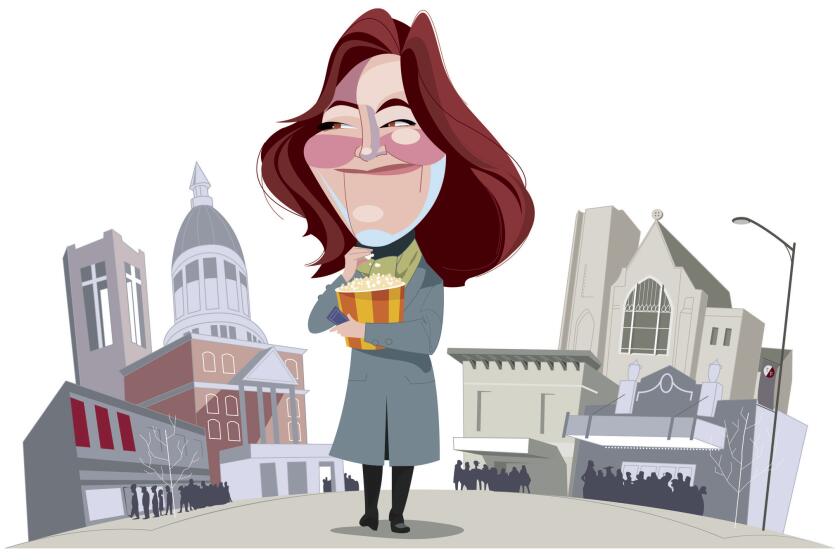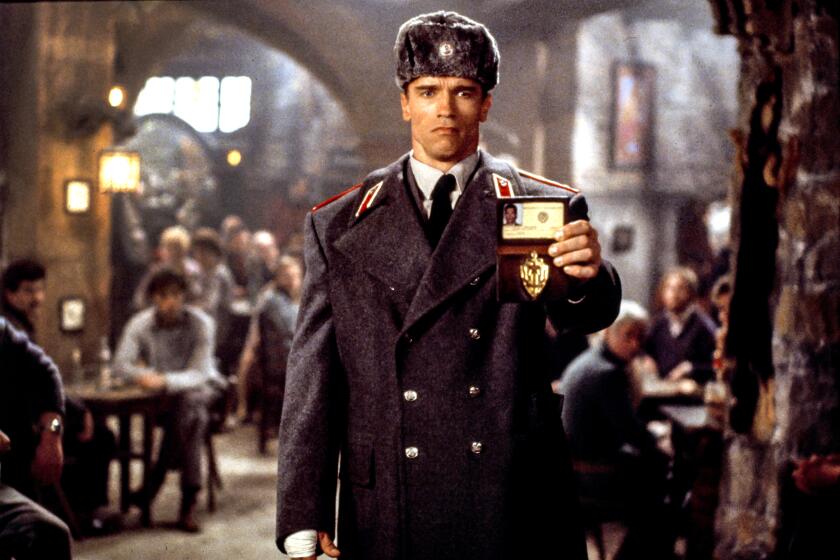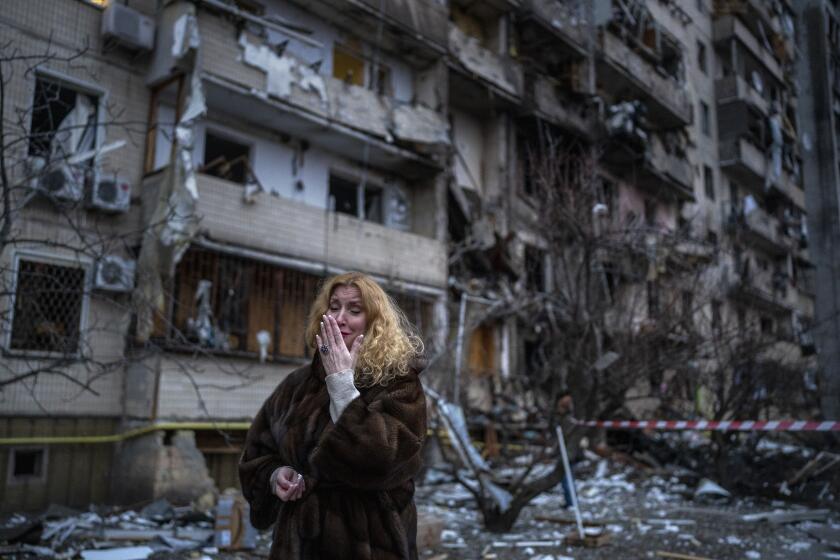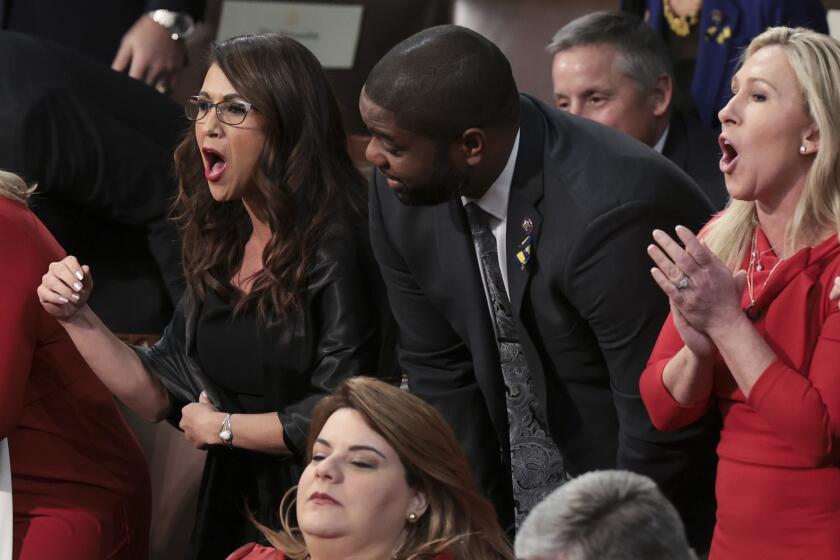At True/False, Russian filmmakers speak out for art and against their country’s attack on Ukraine
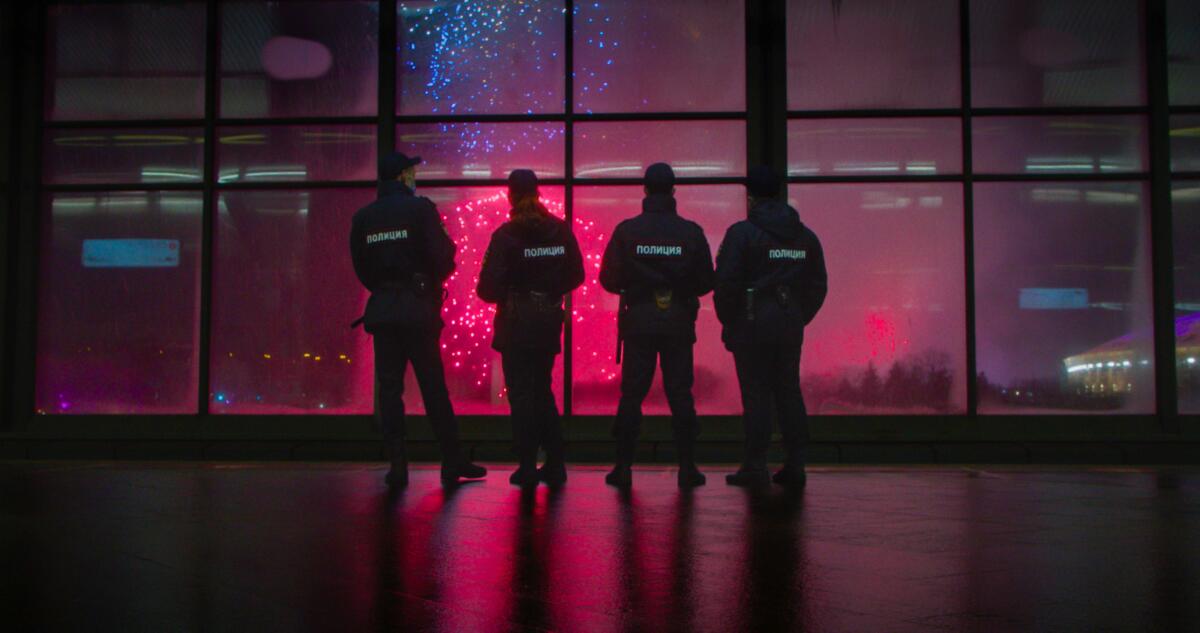
- Share via
“I’m sorry I seem so … sad,” said the young man on the stage. Dressed in a voluminous dark hoodie, he both did and did not look like a filmmaker introducing his award-winning documentary on the first night of the True/False Film Fest in Columbia, Mo. The film, “Where Are We Headed?,” won two awards at last year’s International Documentary Film Festival Amsterdam. Capturing a year in the life of a big-city metro system, it encompasses a panoply of human experiences — the blank-faced morning commute, the peaceful burden of a sleeping child, a raucous New Year’s celebration, police taking positions to quell a demonstration.
But this metro is in Moscow, its baroque stations a reminder of the Soviet Union’s abandonment of churches for proletarian sacristies, and the film’s focus on ordinary life cannot help but serve as a reminder of what is no longer possible in Ukraine since the recent Russian invasion.
No one is more aware of that than the man who made it, Ruslan Fedotow. “It has been an intense time,” he said after apologizing for his subdued appearance. “I read the news every minute. My friends and I did not vote for our current dictator, and we just want this war to end. I hope this film will help explain some of what is happening in Russia,” he added by way of abbreviated introduction. “So enjoy, but yeah.”
He was not the only filmmaker to introduce work at the annual documentary festival last weekend with an air of protest and apology. Nastia Korkia’s “GES-2” lyrically chronicles the conversion of a Moscow power plant into a Renzo Piano-designed cultural center directly across from the Kremlin.
“I think it’s important to make a statement about the war,” she said in lieu of introducing her film. “It should be over, and the troops should be withdrawn. My friends and fellow filmmakers, we are against and totally devastated and sad for it.”
Indeed, “GES-2” is prefaced by an open letter from Russian directors against the war, which drew widespread applause from a packed theater.
Every year, millions of bright red land crabs attempt to escape the jungles of Christmas Island and make their way to the sea.
True/False, which was the last international film festival held in person before COVID-19 shut everything down in 2020, opened on March 3 as the first to return to in-person normalcy in 2022 — and the first to be held in the wake of Russia’s attack on Ukraine and the ensuing sanctions and boycotts. As other festivals grapple with what to do about Russian filmmakers, True/False organizers stated: “We are showing films by singular, independent Russian filmmakers. The filmmakers are not subsidized by Russian oligarchs or the government. Prohibiting artists from expressing themselves is not what True/False is about.”
Audiences certainly agreed. Both films were well attended and roundly applauded for what they were — films made by artists who actively deplore the Russian government’s decision to attack its neighbor.
Fittingly, this year’s lineup also includes Sergei Loznitsa’s four-hour chronicle of how Lithuania became the first republic to leave the USSR.
“Mr. Landsbergis,” which focuses on how the quiet music professor of the title came to lead his country to freedom, chronicles Soviet politics in the early ’90s in almost excruciating detail. But the final hour and a half documents a Soviet army attack on unarmed Lithuanians and the Baltic state’s near-miraculous survival. Both the Russian brutality and the nation’s resilience feel resonant.
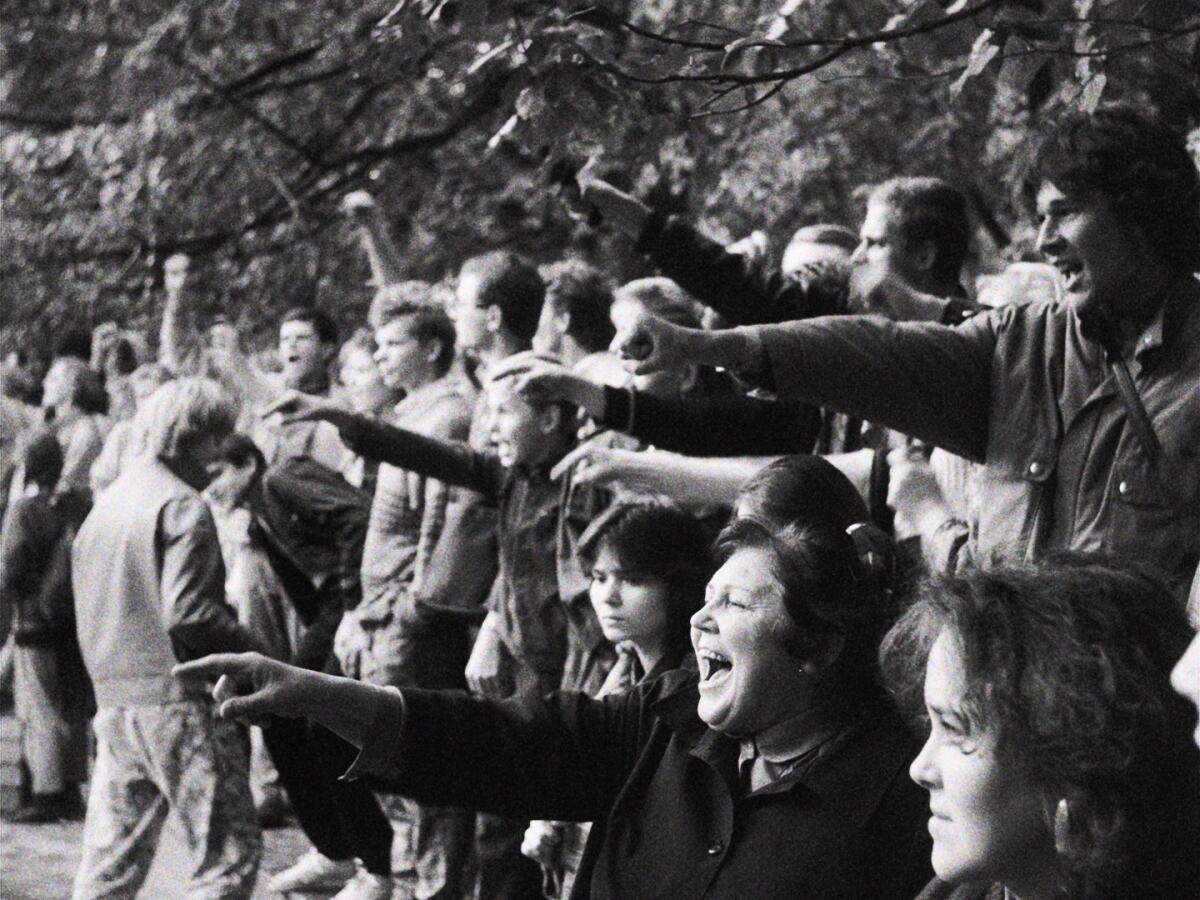
Loznitsa, who is Ukrainian, has spoken out against the war, as well as the boycotting of Russian filmmakers. He was unable to do press at the festival because, it was announced before his film screened, he was traveling across Poland to meet his parents who were fleeing Ukraine.
Korkia and Fedotow, who are a couple, currently live in Hungary; they had also considered skipping the festival.
“It is difficult to be here,” Korkia said in an interview. “To be going to parties and talking to audience. We are checking the news all the time. I have family in Moscow and many friends in Ukraine. That is what is so unbelievable. Russia and Ukraine are so close — my grandmother, who just passed away, spent her best years in Ukraine.”
Korkia had worried about how she and her film would be received by Americans and was amazed by the warm reception. During the Q&A portion of the screening I attended, however, its hopeful ending did draw a comment. “GES-2,” commissioned by the V-A-C Foundation to capture the creation of this building, ends with Piano saying, among other things, that beautiful cities are important because they make good citizens, and good citizens make a better world.
An old trope gains new currency as Putin invades Ukraine.
The stark contrast between his message and the ongoing destruction of Ukrainian cities was the subtext of a question about what Russian artists and Americans can do.
Korkia reiterated her stance against the war, adding that many of her friends have been arrested for protesting. “As I see this film now, I would probably change the ending,” she said. “All activities in GES-2 have stopped. All the artists have closed their shows and left the building, which is sad but the only thing they could do, considering what is happening in Ukraine.”
She is glad she came to True/False so she could let Americans know all this. “And now I can spread the word that Americans want our films. Films are supposed to build bridges.”
With its multilayered consideration of what makes a work of art, “GES-2” is both very Russian — one segment captures a man singing (in Russian, obviously) the words “Sorrow conquers happiness” over and over to different melodies — and wonderfully universal. The construction workers digging and lifting and joining and scraping could be anywhere; a GoPro-aided series of scenes that chronicles the completion of a smokestack is astonishing in any language.

“Where Are We Headed?” is a very different sort of film, though Korkia served as producer (and Fedotow shot some scenes in “GES-2”). Originally from Belarus, Fedotow lived for many years in Moscow and became fascinated by the altered state of life in its metro. “First I wanted to represent that kind of trance, that mode people go into, but the first day I began shooting was Victory Day [in which Russians celebrate the surrender of Nazi Germany in 1945], and I realized that everything that happens above also happens below.”
So he spent a year documenting life beneath the surface, a year that included protests over the arrest of opposition leader Alexei Navalny, which led, in one scene, to police swarming and closing at least one metro station.
Photojournalism scholar Lauren Walsh discusses her new book, ‘Through the Lens,’ and the challenges of photographing conflicts ranging from BLM to Ukraine.
Fedotow also now wishes he could do a different edit on his film in light of Russia’s invasion. “To attack a brother … no one could believe it,” he said. “We thought [Putin] wanted to talk big to Biden, to Macron — we didn’t think he would invade.”
His original cut had, in fact, focused more on “the state, the military presence,” but after showing it to people, he realized he was more interested in “the people, the space, the time.”
Now Fedotow wishes he had emphasized the military more. Or not. “I don’t know,” he said. “Art is art and should not change its identity. But …”
Both he and Korkia are worried about family and friends in Moscow — a new law now makes speaking out against the war punishable by 15 years in jail — and Ukraine. “We are checking news every minute,” Fedotow said, “but we just lost our free press entirely. The last one shut down yesterday.”
Neither filmmaker knows what the war or the boycotts will mean for these films or future projects. But, Korkia said, “this is a small problem compared to what is happening. Until Russian troops leave Ukraine, it does not matter; that is what matters.”
Column: Everyone’s talking about Reps. Boebert and Greene because they stuck out like sore thumbs
Lauren Boebert and Marjorie Taylor Greene heckling Biden during the State of the Union wasn’t just shallow and despicable; it was disastrously timed.
More to Read
Only good movies
Get the Indie Focus newsletter, Mark Olsen's weekly guide to the world of cinema.
You may occasionally receive promotional content from the Los Angeles Times.

